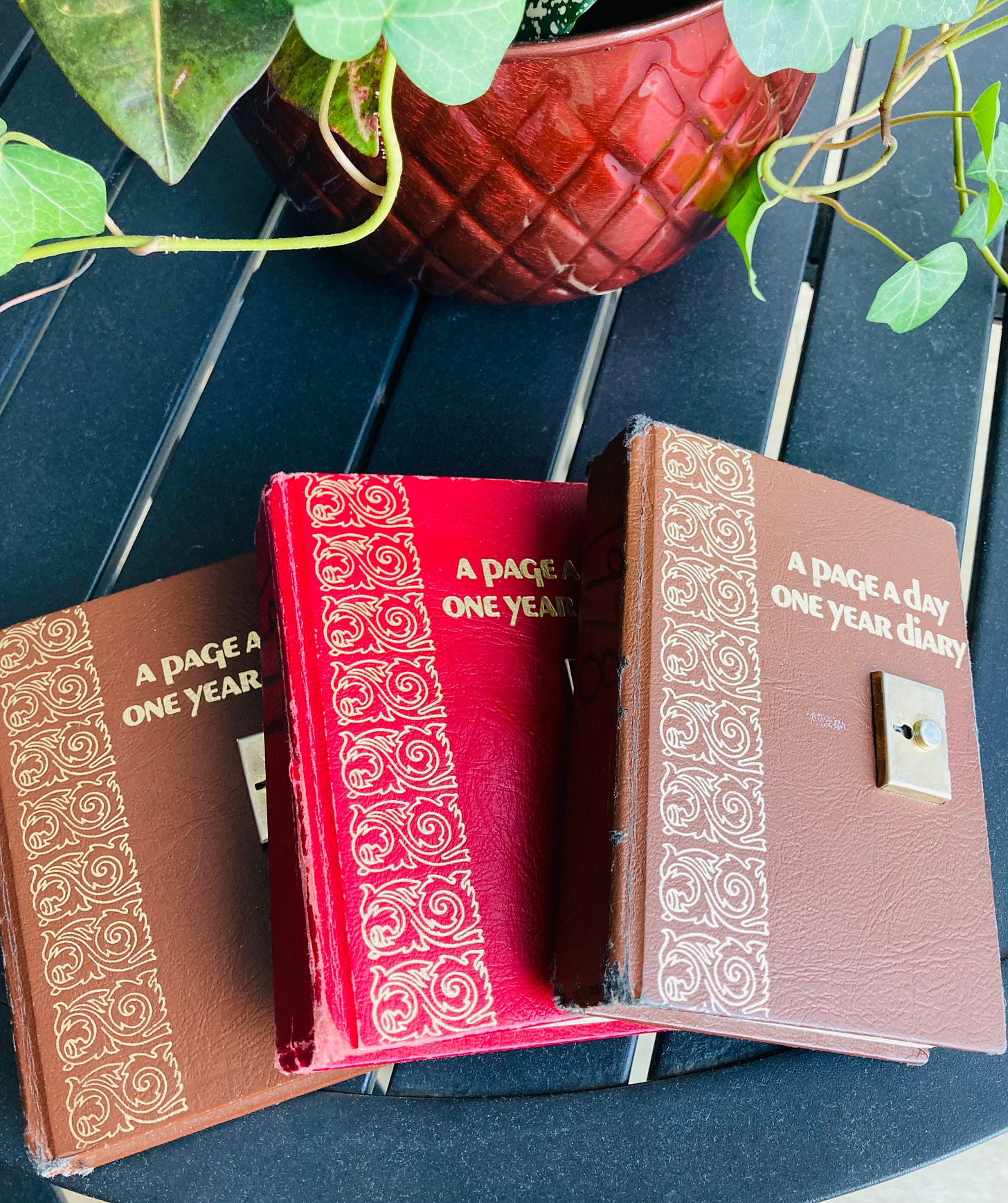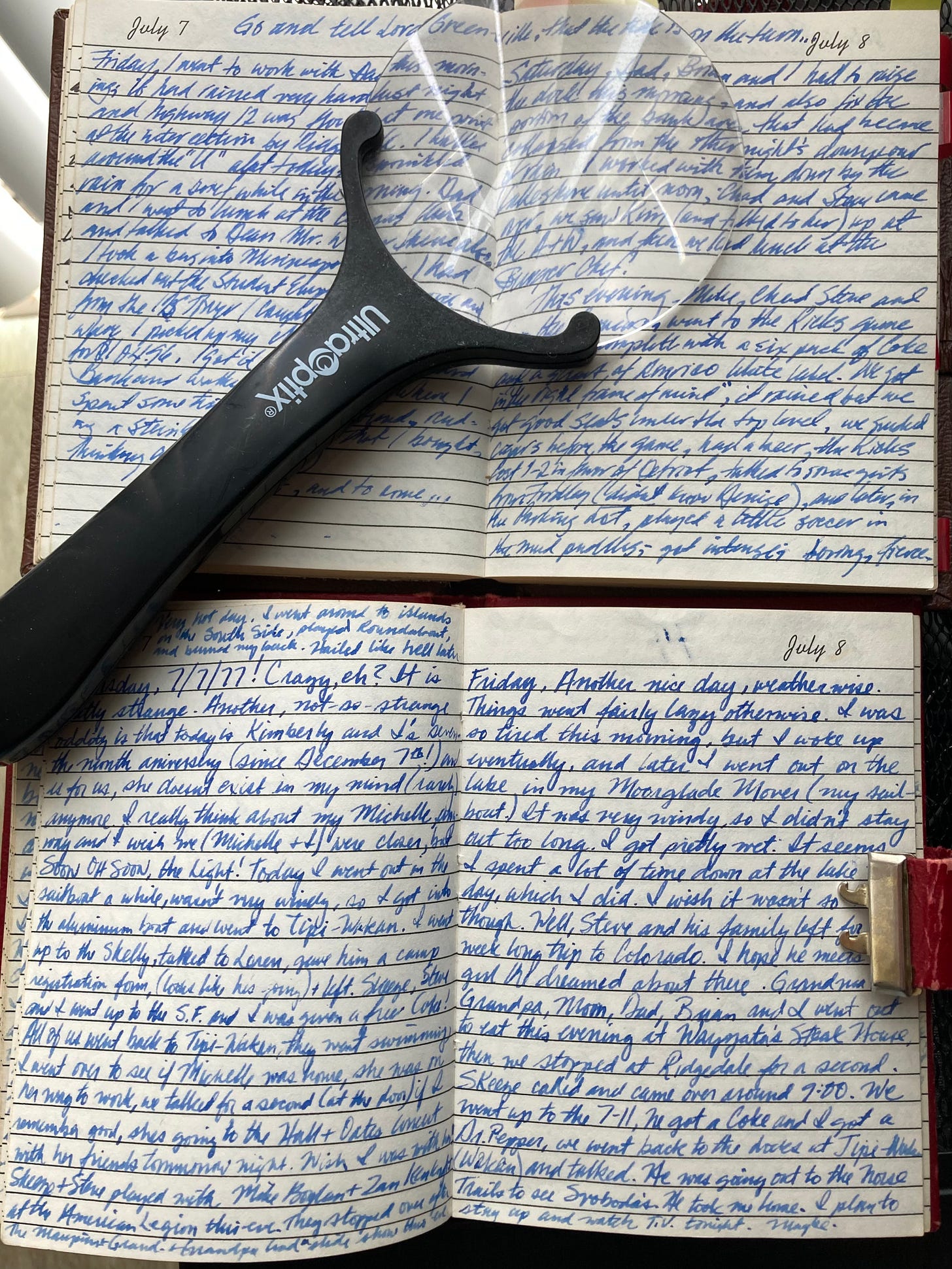Every Day I Write the Books
Part 2: Everything everywhere all at once—and confronted in diaries
“All your compliments and your cutting remarks
Are captured here in my quotation marks.” —Elvis Costello, “Every Day I Write the Book”
Let’s get this off the table first.
Self-reflection does not equal self-absorption, egotism, narcissism, or any other —isms.
That, however, doesn’t mean there isn’t a fine line between them.
We’re unfortunately living now in a freakin’ Golden Age of Narcissism, as best illustrated in an interview George Harrison gave about his song “I Me Mine”:
I kept coming across the words I, me and mine in books about yoga and stuff... [about the difference between] the real you and the you that people mistake their identity to be...I, me and mine is all ego orientation. But it is something which is used all the time...“No one's frightened of saying it, everyone’s playing it, coming on strong all the time. All through your life, I me mine.”
Here’s another way to look at it:
Self-absorption, egotism, self-centeredness, you-name-it, involves statements without questioning anything: “I yelled at my spouse because he never listens to me.”
Self-reflection in diaries or journal writing, as I see it, must involve questions. You start with a statement: “I yelled at my spouse,” but then you wonder, “Why did I do that?”
Hey, I didn’t arrive at this concept the easy way.
Growing up in a small family of somewhat sternly judgmental individuals (to varying degrees) forged my sense of self-worth—as well as roiling shame. When I started writing in the locked-cover diaries, I made sure to conceal them and never wrote outside of my bedroom. Hell, as far as I know I probably even locked the bedroom door while I was writing in them. I don’t recall.

The best example of the self-reflection/self-absorption dichotomy came out my self-reflection ecosystem mentioned in the last post. You see, in the early days all I had was the 1973 diary.
But that was about to change.
I began experimenting with something inspired in no small part by singer-songwriter Justin Hayward of The Moody Blues: “Letters I’ve written/never meaning to send,” from “Nights in White Satin.” I took Hayward seriously and wrote 11 letters to myself (usually around year’s end, over the course of a decade and some years) just to recap and explain how I was feeling. They’re all bound now in a spiral notebook, the first letter dated Sunday, September 9, 1973 (at 10:59 p.m. no less), and the last letter begun on October 27, 1989, and completed (and actually mailed, from London, England) on November 11, 1989 (at 4:29 p.m.):
In a first WordPress post about the letters, I experimented with the ecosystem by “writing a blog post to myself about the letters to myself” that triangulated the far corners of said ecosystem. Referencing what the diary revealed as fact and what the letters only “imagined,” the post was, as you can guess, a shitload of fun to write, and by the end of the experiment very revealing.
—But hey, maybe that’s just “50 plus years talkin’.” LOL.
Things were never real to me until I had written them down. And that, my friends, has never changed.
Writing is my one true love—it’s my third space, my place to belong, my steadfast helpmate and strongest critic. Worrying about what other people think? I can’t know that. I can only guess by what they tell me (if they tell me anything at all). What can other people (or even the idea of other people) give me that I don’t already have?
In the truest sense, we’re all leaving home—without others’ applause or disapproval.
How will we make it?
Leaving Home to Find Home
Writing should be about exploration, which as far as I’m concerned often involves missteps, wrong choices, lack of inspiration—the Complete Shit Sandwich. In a word, failure. But the upside of failure is this: Writing in diaries and journals has taught me that there’s always another day to take one more stab at it—which of course is about resilience and courage.
Forty-nine years ago today, my neighborhood buddy Pete Martin said something to me that I wrote down.
“I have to go to camp,” Pete told me.
“For how long?” I said.
“A whole month.”
“Holy crap, really?!”
“Really,” Pete sighed. “It’s a bummer.”
Okay, the above dialogue might not entirely reflect what happened, but based on a diary entry, it’s a fair approximation. The bigger point is how time becomes magically preserved when you write things down.
While researching a spec screenplay in 1989, I visited a museum dedicated to my protagonist, read the memoirs she’d annotated in her own handwriting there, and was told by the curator’s husband that I was sitting in a chair my protagonist’s partner (and father of her two children) had designed and built for their house together. I was stunned.
The past isn’t dead, I thought, it’s only sleeping.
This, I believe, is true for everyone. Your own diary will hit that home for you.
It might even entice you to change your life.
Rewriting Your Story
Obviously you can’t rewrite what you haven’t first written. Writing is funny that way. It likes being plunked down on paper. My diaries were the impetus to keep going, to just. Keep. Writing.
Sure there were a couple blank pages. A lot of missed opportunities to clarify. Plenty of grandstanding. Loneliness and regret. Moments of revealing emotion, embarrassment. Laugh-out-loud times.
I’m still trying to understand why I’m on this journey—which this summer has raised as a question again after I’d finished pasting in the 2013-2017 journals (I left the diary format in 1978) and adding 2018 and writing more for 2023—and maybe that’s why we’re here.
Like…here, here.
Right now.

Friday, July 7, 2023.
Looking at an old diary: “Go and tell Lord Grenville,” Al Stewart sang, “That the tide is on the turn.” Jotted down in July 1976, just after his Year of the Cat LP came out.
Who knew?
And Thursday, July 7, 1977. “7/7/77! Crazy, eh?”
Totally.
“Everyone,” John Barth once said, “is necessarily the hero of their own life story.” I picked this up from author Brad Stulberg’s blog, and it piqued my interest, given my recent thinking about diaries, journals, and the stories we tell ourselves (and others) about our lives.
Stulberg writes:
When you adopt a too-strong narrative orientation toward life, you unknowingly impose artificial limits and constraints on what you might do next. You essentially pigeonhole yourself into a certain trajectory. A good story almost never radically changes course. A good life often does.
People with strong narrativist orientations are at risk of setting out on certain trajectories and failing to change (because it would contradict the story they are telling themselves about themselves) or not even realizing change is possible to begin with (because their story becomes a selective filter through which they see the world).
Stulberg’s comments seem to underpin my assertion that self-reflection, peppered with probing questions, is precisely the way to use diaries and journals to “change the trajectory” of your life, while still preserving the story of how you became the person you are in the first place.
But you can’t know who you are until you reflect on who you were. And that requires curiosity, patience, forgiveness—heck, even just gratitude for being alive.
No small potatoes, right?
Hey, I want to know who you are.
Maybe you want to know who you are.
Let’s find out together, ’k?
Next up in this series we’ll examine commonplace books, pocket-sized notebooks, and larger sketchbooks I turned into monthly calendars. We’ll also look at the future of this self-reflection ecosystem and brainstorm new innovations to it. Thanks for subscribing and see you next week! —MM






Loved this exploration! Exciting to see how your thoughts (and handwriting) changed over the years!